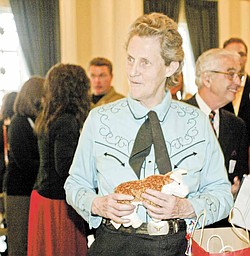Grandin speaks of a life of challenges, achievement
The Vindicator
Temple Grandin greets guests at the reception before her Tuesday night speech at a sold-out Stambaugh Auditorium. The animal scientist and author talked about her career in the livestock industry, her life with autism and other topics.
TEMPLE GRANDIN
A brief look
The famous animal scientist, author and speaker who was diagnosed with autism at a young age spoke Tuesday at Stambaugh Auditorium about her career in the livestock industry, her life with autism and other topics. Some facts about her:
Was diagnosed with autism in 1950 and didn’t start speaking until about age 4.
Grandin’s parents were told she would eventually have to be institutionalized.
Later developed her talents into a successful career as a livestock-handling equipment designer.
Is responsible for designing facilities in which about half of the cattle in the U.S. are handled.
Professor of animal science at Colorado State University near Fort Collins, Colo.
Author of numerous books, including “Emergence: Labeled Autistic,” “Thinking in Pictures,” “Animals in Translation,” “Animals Make Us Human,” “Unwritten Rules of Social Relationships” and “The Way I See It: A Personal Look at Autism and Asperger’s.”
Has been featured on programs such as “The Today Show,” “Larry King Live,” “20/20” and “Primetime Live.”
In 2010, was included as one of Time magazine’s 100 most influential people in the world.
Was the subject of the 2010 HBO self-titled film starring Claire Danes that was nominated for seven Emmy Awards and won five, including for Best Director and Best Made-for-TV movie.
Source: templegrandin.com
By Sean Barron
YOUNGSTOWN
If you wish to trace the origins of Temple Grandin’s success as an animal scientist, author, college professor and lecturer, you would do well to start with her 1950s-style upbringing.
Grandin, of Fort Collins, Colo., was diagnosed with autism at age 3, when few people ever heard of the disorder. Shortly thereafter, her parents were told it was just a matter of time before she would have to be institutionalized.
Despite that grim prognosis, Grandin’s mother forged ahead and taught her daughter the importance of basic social rules, manners and graces while making it clear what was and wasn’t acceptable.
That training laid the groundwork for Grandin, 63, to become one of the world’s most recognized, successful and sought-after people on the autism spectrum.
Her 90-minute, sold-out presentation Tuesday at Stambaugh Auditorium was sponsored by the Paula and Anthony Rich Center for the Study and Treatment of Autism at Youngstown State University.
Grandin, who has written many books on the neurological disorder, noted that the autism spectrum varies widely from those who are nonverbal to those who exhibit genius skills and have jobs in California’s Silicon Valley.
“At one end are the kids who are very severe; at the other end of the spectrum, you have the geeks and nerds,” she said, adding that children with autism should be encouraged to learn valuable skills and be continually stimulated but not pushed too hard as to overload their senses.
She is a strong advocate of early education and intervention and said youngsters age 2 and 3 need 20 to 30 hours a week of one-on-one intervention.
She noted that many people with autism have widely varying sensory problems that include little or no tolerance for fluorescent lights and scratchy clothing. Putting on and removing weighted vests in 20-minute increments often help increase their concentration, she said.
Before entering the job market, people with autism should visit a variety of workplaces, use mentors and create a portfolio of their projects, she advised.
Grandin said she was pleased with the 2010 HBO movie “Temple Grandin” starring Claire Danes as Grandin, which chronicled her struggles with autism and her bonds with animals, among other things. The film, which Grandin hopes will motivate kids to succeed and overcome adversity, won five Emmys and a Peabody Award.
Even though Grandin accepts autism as part of her personality and credits it for her success, she does not want to be defined by the disorder that has increased dramatically in recent years.
“Autism is a very important part of who I am, but not the only thing,” she said.
For more informaiton on Temple Grandin, see Vindy.com.
 43
43

